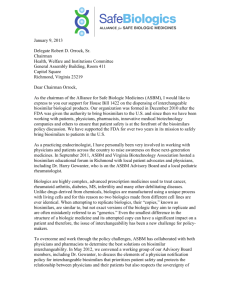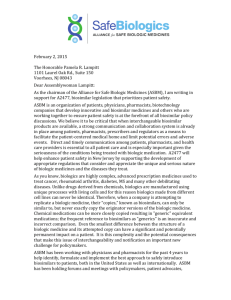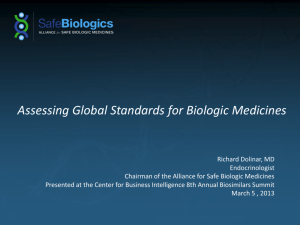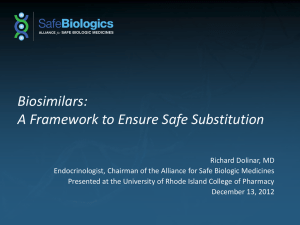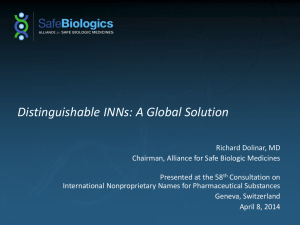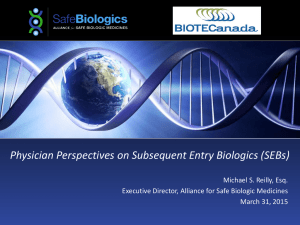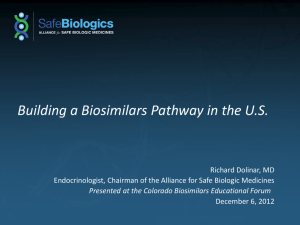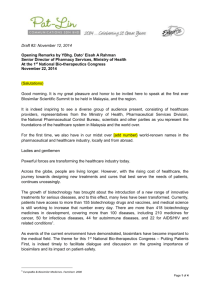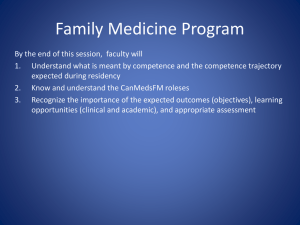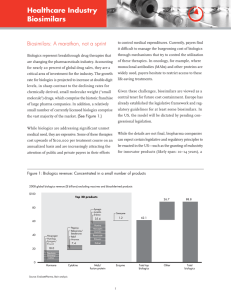here
advertisement
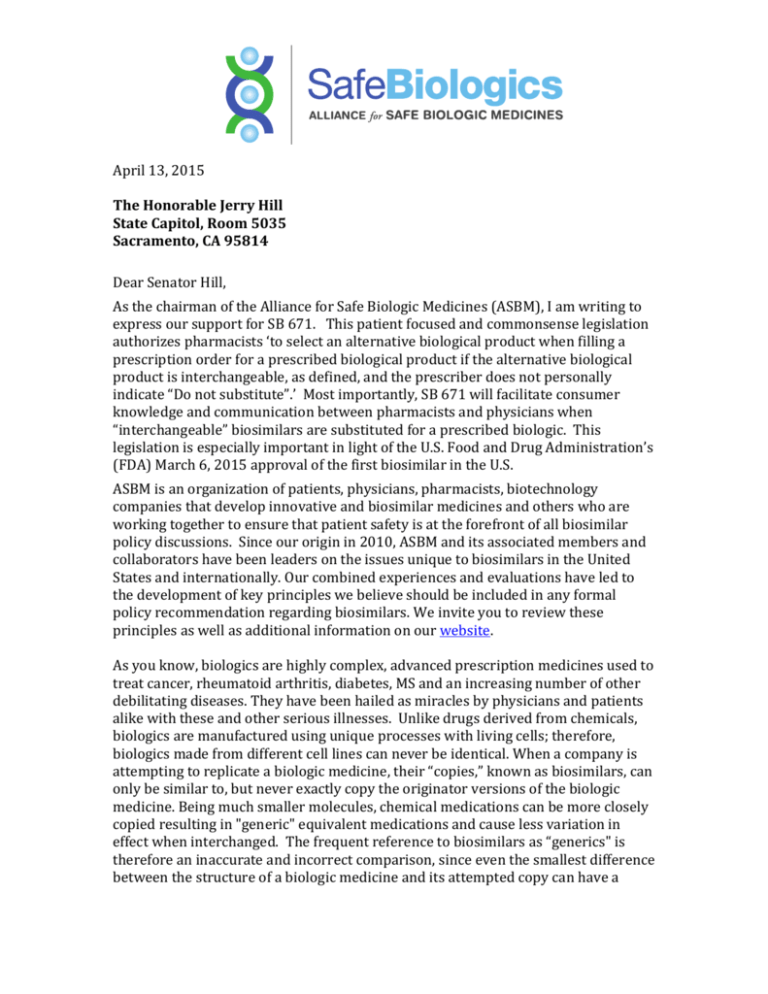
April 13, 2015 The Honorable Jerry Hill State Capitol, Room 5035 Sacramento, CA 95814 Dear Senator Hill, As the chairman of the Alliance for Safe Biologic Medicines (ASBM), I am writing to express our support for SB 671. This patient focused and commonsense legislation authorizes pharmacists ‘to select an alternative biological product when filling a prescription order for a prescribed biological product if the alternative biological product is interchangeable, as defined, and the prescriber does not personally indicate “Do not substitute”.’ Most importantly, SB 671 will facilitate consumer knowledge and communication between pharmacists and physicians when “interchangeable” biosimilars are substituted for a prescribed biologic. This legislation is especially important in light of the U.S. Food and Drug Administration’s (FDA) March 6, 2015 approval of the first biosimilar in the U.S. ASBM is an organization of patients, physicians, pharmacists, biotechnology companies that develop innovative and biosimilar medicines and others who are working together to ensure that patient safety is at the forefront of all biosimilar policy discussions. Since our origin in 2010, ASBM and its associated members and collaborators have been leaders on the issues unique to biosimilars in the United States and internationally. Our combined experiences and evaluations have led to the development of key principles we believe should be included in any formal policy recommendation regarding biosimilars. We invite you to review these principles as well as additional information on our website. As you know, biologics are highly complex, advanced prescription medicines used to treat cancer, rheumatoid arthritis, diabetes, MS and an increasing number of other debilitating diseases. They have been hailed as miracles by physicians and patients alike with these and other serious illnesses. Unlike drugs derived from chemicals, biologics are manufactured using unique processes with living cells; therefore, biologics made from different cell lines can never be identical. When a company is attempting to replicate a biologic medicine, their “copies,” known as biosimilars, can only be similar to, but never exactly copy the originator versions of the biologic medicine. Being much smaller molecules, chemical medications can be more closely copied resulting in "generic" equivalent medications and cause less variation in effect when interchanged. The frequent reference to biosimilars as “generics" is therefore an inaccurate and incorrect comparison, since even the smallest difference between the structure of a biologic medicine and its attempted copy can have a significant and potentially permanent impact on a patient. It is this complexity and the potential significant consequences, both positive and negative that make this issue of interchangeability and notification an important new challenge for policymakers. We are pleased your proposed legislation addresses these issues in a manner that promotes patient safety and increased collaboration by all members of the patients’ health care team. ASBM has been working with physicians and pharmacists for the past 4 years to help identify, formulate and implement the best approaches to ensure the safe introduction and monitoring of biosimilars in the United States as well as internationally. We have been holding forums and meetings with policymakers, patient advocates, physicians, pharmacists and other stakeholders across the country to discuss and educate the policy challenges associated with these nextgeneration medicines and the accompanying need for stringent manufacturing and notification standards to ensure patient safety and improved health. Specifically, ASBM believes appropriate regulations are needed to ensure doctors and other prescribers know what medicines are actually dispensed and administered to their patients. Physicians and pharmacists should work collaboratively in order for the safety and well-being of patients remains the top priority. It is therefore necessary for physicians to be informed in a timely fashion of the exact biologic – by manufacturer – their patient receives in order to accurately assess the medication's efficacy as well as more precisely attribute any adverse events that may occur. We have performed multiple surveys demonstrating significant gaps in the knowledge about biosimilars among physicians, pharmacists and patients. For example, ASBM just released a new survey on labeling revealing that physicians who prescribe biologics support transparent, clear labels with data that enables prescribers and their patients to more fully understand and evaluate the medicines being prescribed. The resulting enhanced communication between patients, pharmacists and physicians will improve the safety, efficacy and appropriate use of biologic products, both originators and biosimilars, producing more and better treatment options for these serious and chronic diseases. To further this goal, Dr. Philip Schneider, chair of our International Advisory Board and Associate Dean at the University of Arizona College of Pharmacy led a continuing education course at the Long Island University College of Pharmacy on March 15, 2015 entitled “The Fundamentals of Biosimilars: What Every Pharmacist will need to Know” discussing these issues. Ronald Jordan, Ph., FAPhA, the founding dean of Chapman University in Orange County and I also participated and we are working together to host a similar event in Irvine next month. We have strongly supported the FDA and other regulatory bodies around the world on the creation of biosimilar policies that keep patient safety at the forefront. We are proud to similarly support you and your efforts in making patient safety a priority for all citizens of the Golden State. Please feel free to contact me on my personal cell at (804) 307-6896, or the ASBM executive director, Michael Reilly (Michael@safebiologics.org/202.222.8326), if you have any questions or if we can be of any additional service to you in promoting this important legislation. Sincerely, Harry Gewanter, M.D. Chairman, The Alliance for Safe Biologic Medicines Members: Alliance for Patient Access American Academy of Dermatology American Autoimmune Related Diseases Association Association of Clinical Research Organizations American Council on Science and Health Amgen American Association of People with Disabilities Association of Black Cardiologists Association of Gastrointestinal Motility Disorders, Inc. BIOTECanda Biotechnology Industry Organization Colon Cancer Alliance Colorectal Cancer Coalition EuropaBio Genentech Global Colon Cancer Association Global Healthy Living Foundation Health HIV Interamerican College of Physicians and Surgeons International Cancer Advocacy Network Kidney Cancer Association MANA National Hispanic Medical Association National Alliance on Mental Illness National Psoriasis Foundation RetireSafe ZeroCancer
